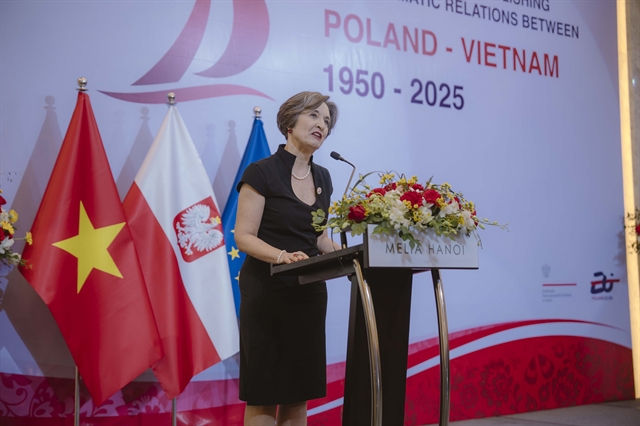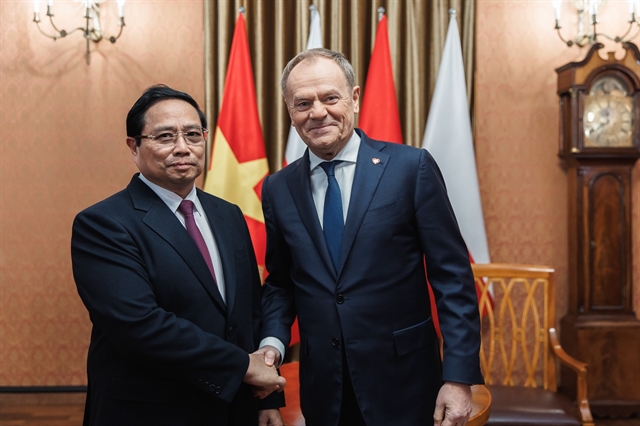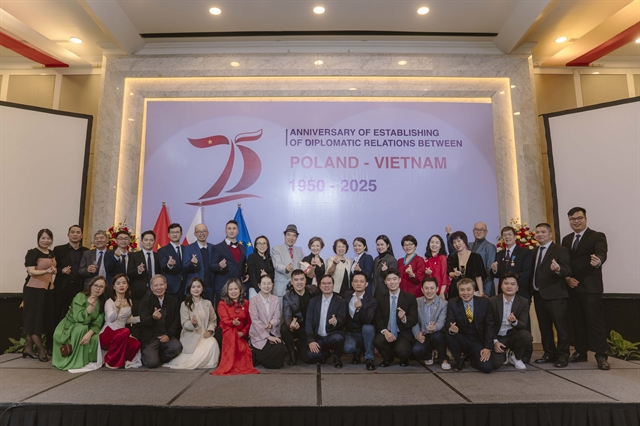.jfif) Opinion
Opinion

The Head of Mission from the Polish Embassy, Joanna Skoczek, wrote for Việt Nam News ahead of the country’s Constitution Day.
Every year on the 3rd of May Poland celebrates its Constitution Day. It is an opportunity to look back at our history and the tireless efforts of our ancestors to protect the nation’s identity and sovereignty.
I am very often asked about the similarities between Poland and Việt Nam. Despite the geographical distance, we share a lot of them, starting with deep respect for family and community values, to the strong spirit of entrepreneurship, to the challenging geographic location and sometimes troublesome neighbourhood. The latter is also the reason why both our nations express such an interest and respect for history. We both know that nations should be aware of their past to draw lessons for the present and the future.

|
| Joanna Skoczek, Head of Mission, at the reception celebrating the 75th anniversary of the establishment of diplomatic relations between Poland and Việt Nam, in February 2025. Photo Courtesy of the Embassy |
The Constitution we remember on that day dates back to the year 1791. It has been adopted at a pivotal moment, when the existence of Poland as an independent state was at stake. Our then neighbours, afraid of Polish-Lithuanian Commonwealth political position, but also aware of its internal weakness, started to take away the pieces of the country’s territory and interfere in its politics in order to destabilise our homeland.
Adoption of the May 3rd Constitution was a patriotic and brave, although desperate, attempt to save the country from the imminent danger of collapse. The Polish Constitution of 1791 was the first in Europe and only the second in the world, after the American one of 1787. Although the document had not lasted long, it brought about the foundation of a modern state, creating the legacy that helped national idea to survive through the years of foreign occupation that lasted for 123 years.
Even if in the years and decades following the adoption of the constitution Poland did not enjoy full independence and was not sovereign neither in its internal affairs not in the external relations, the spirit of this first modern basic law endured in the thinking about the statehood and political system. Three pillars of power, hereditary monarchy, legal protection for peasants and bourgeoisie, as well as resignation from the veto right in the parliament, constituted the background of a more just, equal and stable society.
I strongly believe that this story sounds familiar to our Vietnamese friends. As I am writing these words, Việt Nam is about to celebrate the 50th anniversary of its reunification, after the long period of foreign occupation and partition of the country and nation against its will. What helped to survive through these tough times was national identity, perseverance, dignity and pride. Traditions, language and culture were conveyed between generations, from mothers to daughters and fathers to sons. The pursuit of freedom and longing for independence were imprinted in the national DNA and enabled the nation to rise, to win and to succeed.
The very same description may be applied to Polish fight for freedom and independence, against foreign invaders and occupants. What helped the Polish nation to endure without the statehood and on occupied territory, was faith that one day the wheels of history will turn in our favour.

|
| Polish Prime Minister Donald Tusk (right) and Vietnamese Prime Minister Phạm Minh Chính during the latter's official visit to Poland, in January 2025.Photo Courtesy of Chancellery of the Prime Minister |
When you compare our two histories, it becomes evident why Poland and Việt Nam get along so well and why we celebrate this year 75th anniversary of our diplomatic relations in the spirit of mutual trust, respect and friendship.
I see international relations as a net of diverse and complementing bonds. Interest in culture can ignite the passion for learning the language. A meeting and exchange with tourists may result in mutually enriching experience, a discussion about culture, traditions, or history. A business encounter will result in an in-depth conversation about the opportunities offered by our respective countries, their wealth and beauty. A tourist visit can open the doors for successful business cooperation.
Fond memories and close relations maintained by the thousands of graduates of the Polish universities with Poland and our Embassy show the strength of the bonds of friendship. At the Polish end, we have a strong and very well integrated Vietnamese community that calls Poland its home and is instrumental in shaping and maintaining relations between our societies and countries.
As two peace loving nations, Poland and Việt Nam should work hand in hand to contribute to peace, security and development in our regions and worldwide. Our respective histories show that the universal beliefs, ambitions, goals and ideals are stronger and more important than differences. VNS

|
| Staff from the Embassy of Poland together with generations of Vietnamese alumni who studied in Poland at the ceremony celebrating the 75th anniversary of the establishment of diplomatic relations between Poland and Việt Nam, in February 2025. Photo Courtesy of the Embassy |




